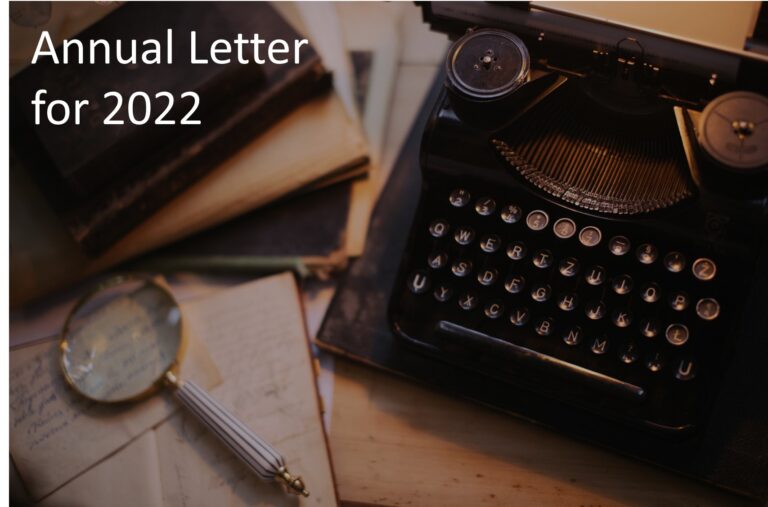
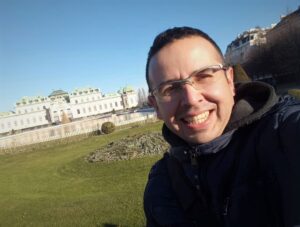
By Juan Pablo
González-Rivas
January 11, 2022
2021 was a challenging year globally and individually. This letter summarizes our main research achievements and what is coming in 2022.
The Global Scenario
Worldwide, 2021 was a year with big challenges and remarkable achievements. The COVID-19 pandemic impacted our lives since day one, causing more than 5 million deaths and trillions of dollars in economic losses. As a global community, our healthcare weaknesses were highlighted, especially at primary care level, and in the control of chronic non-communicable diseases, like obesity, type 2 diabetes, and hypertension. The extreme gap between high and low-income countries was dramatically exposed.
Despite these challenges, amazing achievements arose. By January 2022, 9.28 billion vaccine doses have been administrated globally, representing that 58.6% of the world population has received at least one dose, each time new medications are presented increasing the portfolio of treatment, and the international collaboration is becoming the norm.
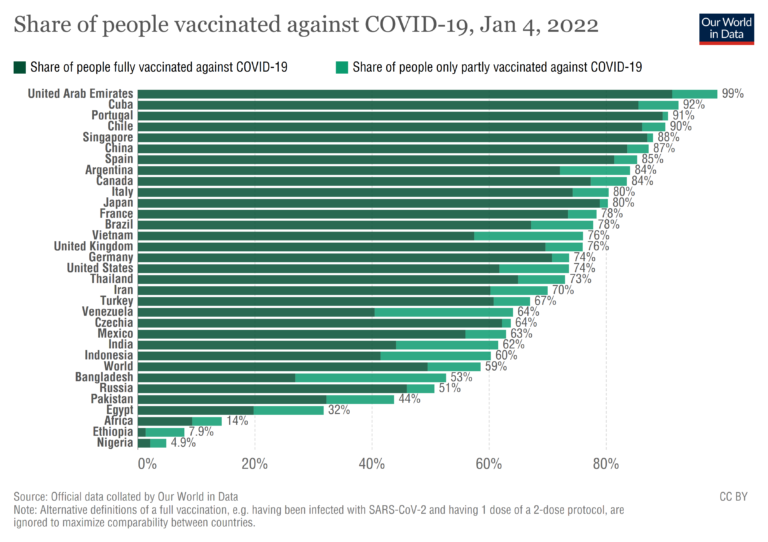
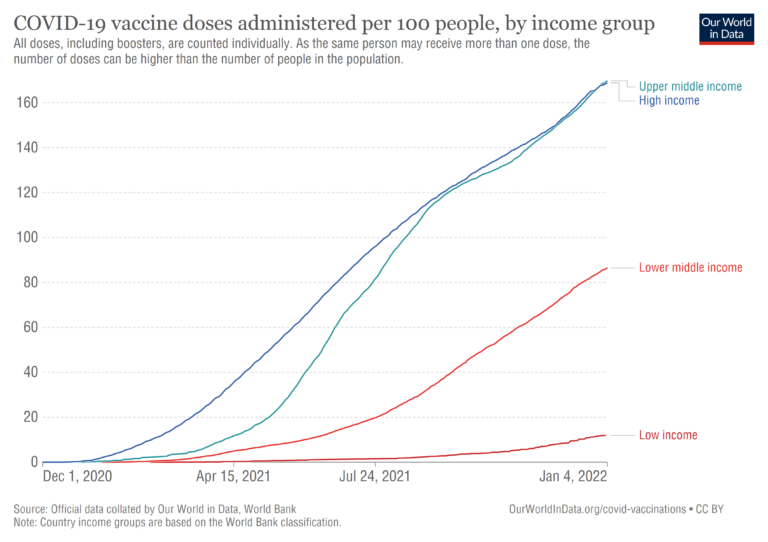
The figures from Our World in Data (https://ourworldindata.org/covid-vaccinations) show the two sides of our coin, the great achievement on the left and the health inequality on the right. (Mathieu, E., Ritchie, H., Ortiz-Ospina, E. et al. A global database of COVID-19 vaccinations. Nat Hum Behav (2021)).
More than ever, we need to be optimistic about what can we reach together in 2022, and how things will continue improving.
The Personal Scenario
To me, 2021 was also an exciting and challenging year. I’m going to structure the core of this letter in four sections, A- sharing the lessons that I learned in 2021; B- our research achievements, C- what is coming, and D- acknowledgments. Please feel free to move to the area of your interest.
A. Lessons Learned
1) Bet for the “Crazy Visionaries”.
I have little more than two years in Czechia, migrating from the Venezuelan crisis, which is reaching 5.9 million migrants. Sadly, the Venezuelan situation remains without changes, and millions of people continue suffering. However, most of the migrants that I know are always taking care of their loved ones in the country or any other difficult scenario, but few of them stand out with their support like Jose Luis. Two years ago, I was drinking beers and playing pool in Boston with Jose Luis Orejas, when he explained to me some “crazy” and brilliant ideas about how to help the Venezuelan population. To me, it was not the first time that I lisent his ideas, and I tried to encourage him to move forward with them. On Nov 30, Jose was honored with the Equity, Social Justice, and Advocacy award by the Harvard Medical School for his contribution providing solutions to deliver medications from the US hospitals to the Venezuelan hospitals, addressing one of the biggest challenges in the crisis reducing the shortage of medications. Congrats Jose for this enormous effort and continue thinking differently.
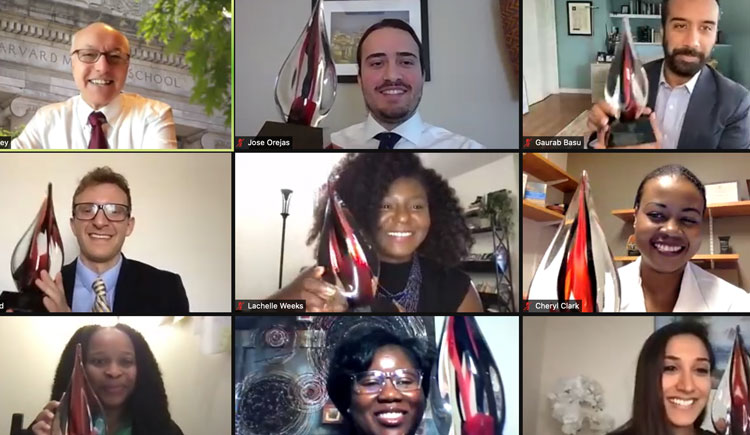
Jose is the middle of the top row of pictures
It is extremely important to identify and support people with ideas that can overcome the difficulties imposed by the environment, but this requires learning to be focused on the aspects that matter (ideas), and stop paying attention to the minor but recurrent minorities that the daily life try to steal our energy and time.
By the way, Jose is very good at advocacy, but not paying pool, I won almost all the games 🙂
2) Recognize the Unrecognized Braves Living by the Uncertainty of Grants.
Talking with friends, researchers from different parts of the globe, I realized that there are too many depending on the lottery of grants, in different kinds of institutions, in high and low-income countries. I believe that someone should be very brave to put their entire family sustainability into the lottery of grants. Some people migrate with their families, crossing the world, searching for a better future for their children, and working hard in this scenario. One of these brave men, which I admire, is my friend and co-worker Geraldo Maranhao Neto. My admiration for all those researchers who maintain their work ethic despite living in uncertainty.
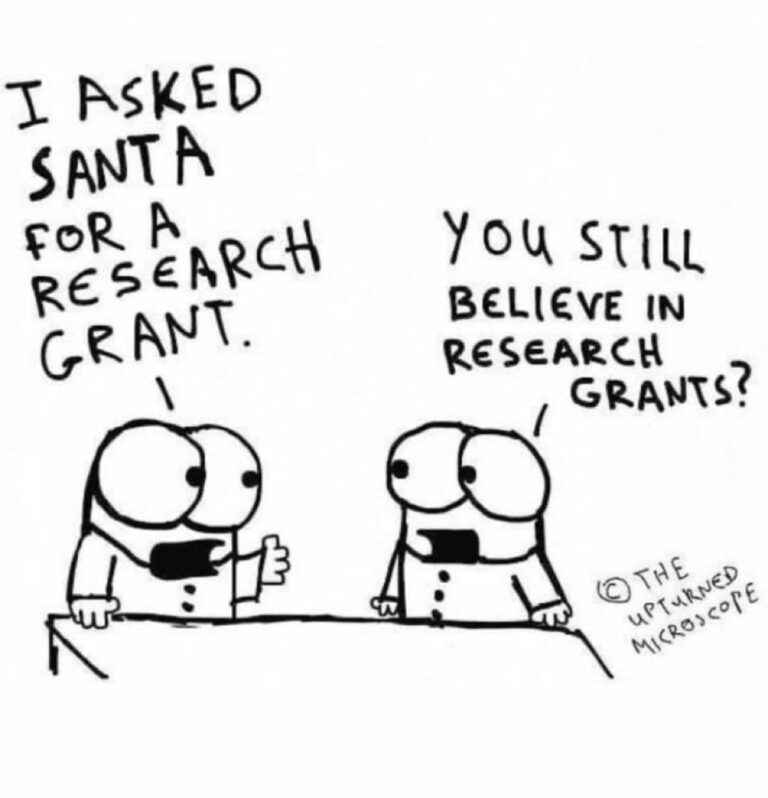
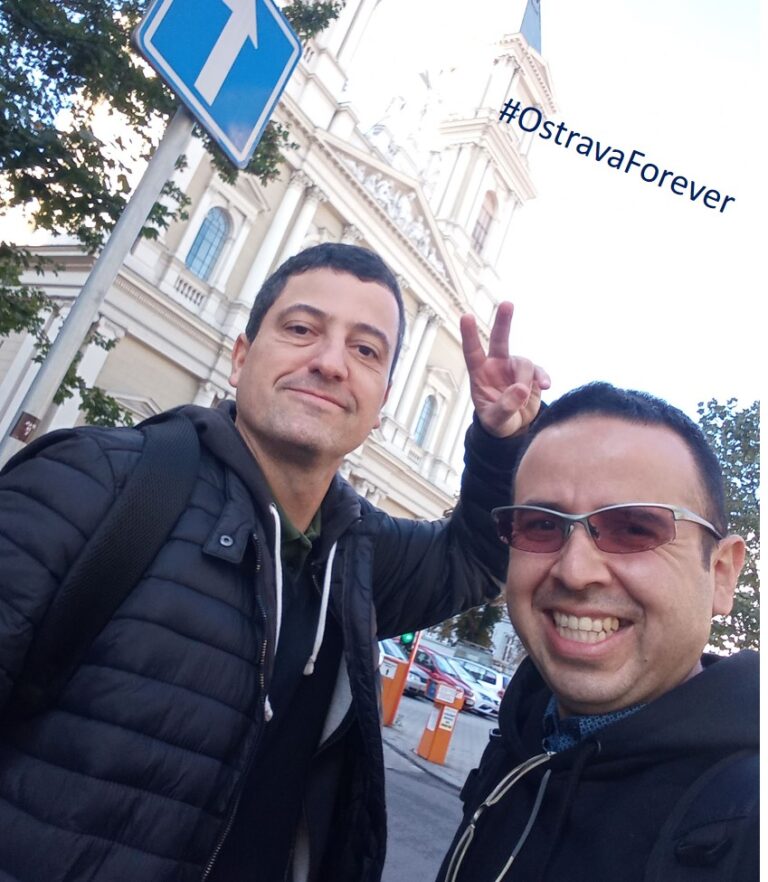
Me and Geraldo attending a research meeting on Ostrava
3) “Never Give Up”, Really?
People do not like “quitters”. There are a lot of motivational materials around the “Never Give Up” sentence. We tend to hear it from people who inspire us. The words “Never Give Up” are in the genes of “perseverance”. Perseverance is probable the mother of all the requirements needed to have extraordinary success. But, what happens if you are moving in the wrong direction? What happens if you are fighting with the “wrong enemy”? How can we handle the contradiction between staying focus on the things that matter and letting go or “giving up” on those that do not?
Those who are perseverant and relentless with what they want can understand these questions. Persons chasing extraordinary success hold what they are doing like a Lyon holds their prey until they get what they want. It is very difficult to let go, to sit and say “I give up”. Sometimes the struggle of the daily routines doesn’t let’s sit, reflect, and think if it is worth it. The environment can push you in the wrong direction. Maybe it is not in your genes “let it go”. I learned to give up on the things that are not worthy, and use that energy, and focus on those things that matter.
Persevere and “never give up” in the areas that matter, in those driving you to the vision that your instincts are pushing you. But re-evaluate periodically if the winds change and the environment is taking you in the wrong direction, and reestablish the right course, life is not a straight line.
4) “All the Roads Lead to Rome” – The Effect of the Environment on the Human Behavior.
The First Road: Leadership and Team Work
I have been reading about leadership for more than a decade, but my intense study started a little more than two years ago when I get a leading position in an international multicultural group. The daily challenges push me to an intense journey of books and videos that help me to shape my leadership beliefs and strategies. Briefly, I define a leader as a person who inspires people to move to a vision, giving them value, by setting the environment. A group of people with psychological safety, working inspired to the vision can reach unimaginable things. Psychological safety is a mental state where you can act without fear, the person feels that belong to the place (inclusion), can learn, knowing that can make questions, feeling that is contributing and can challenge their limits without the threat for making a mistake. Psychological safety is set by the leaders, establishing the policies, but mostly, by establishing the culture of the organization.
The Second Road: Parenthood
Parenthood is the master challenge of leadership. We pursue the vision of our sons and daughters liberating their potential, reaching their dreams, and being happy and healthy. As parents, we have the power to set how is going to be the environment in the house.
Which and how are going to be the rules and the usual behavior to protect them? Are they going to be afraid? Are they going to feel physiological safety to try, fail, and learn? Their behavior is going to be a response to the environment that you are setting. This effect can be easily observed with the food. If you always have cake and ice cream in the refrigerator they are going to eat a lot of that. If you always maintain fresh fruits on the table, they are going to eat more of that. It is not a mathematical response, but the likelihood of the behavior increase. This example can be extended to every area in a family.
The Third Road: Social Determinants of Health
It is astonishing to understand that about 75% of an individual’s health can be attributed to the social determinants of health, leaving only 25% for their biology and behaviors. Social determinants are the conditions in which people are born, grow, live, work, and age. They reflect the environment set around our lives. A dramatic example can be observed in the study of Raj Chetty et al, published in JAMA in 2016, where men at the top 1% income in the US live 15 years more than those men in the 1% bottom, independent of race and ethnicity. In women, this difference was of 10 years.
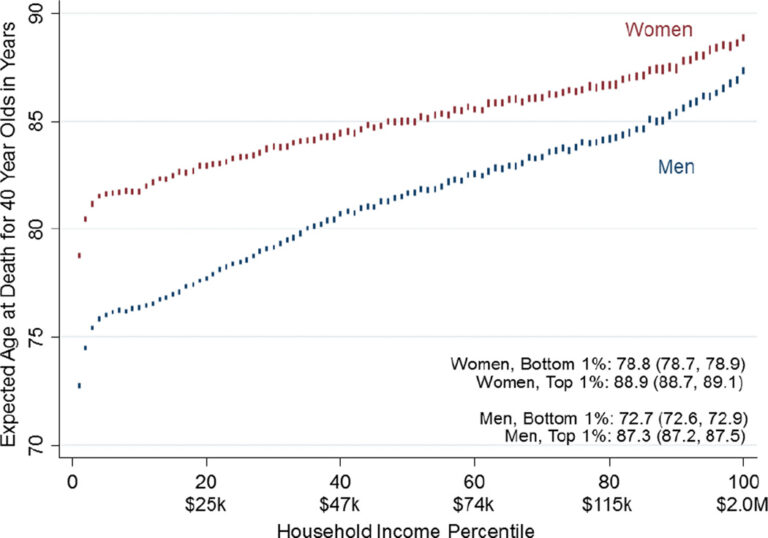
Figure: Race- and Ethnicity-Adjusted Life Expectancy for 40-Year-Olds by Household Income Percentile, 2001–2014
These three “roads”, briefly described, express the same principle of how human behaviors are dependent on the environment in our society, workplace, and home.
B. Research Achievements of 2021.
I’m proud that we reached good research achievements with different teams in different settings, all pushing forward the knowledge of cardiometabolic risk factors and building capacity at diverse levels.
In the Czech Republic, at the International Clinical Research Center in the Kardiovize Team, we continued the validation of the Transcultural Cardiometabolic-Based Chronic Disease model (tCMBCD-CZ). An evidence-based transculturalization process for lifestyle interventions is being developed to address the increasing burden of dysglycemia and abnormal adiposity in Czechia. Among all the members of the team, Iuliia Pavlovska and Anna Polcrova have been key memberpersons working hard to move these papers forward.
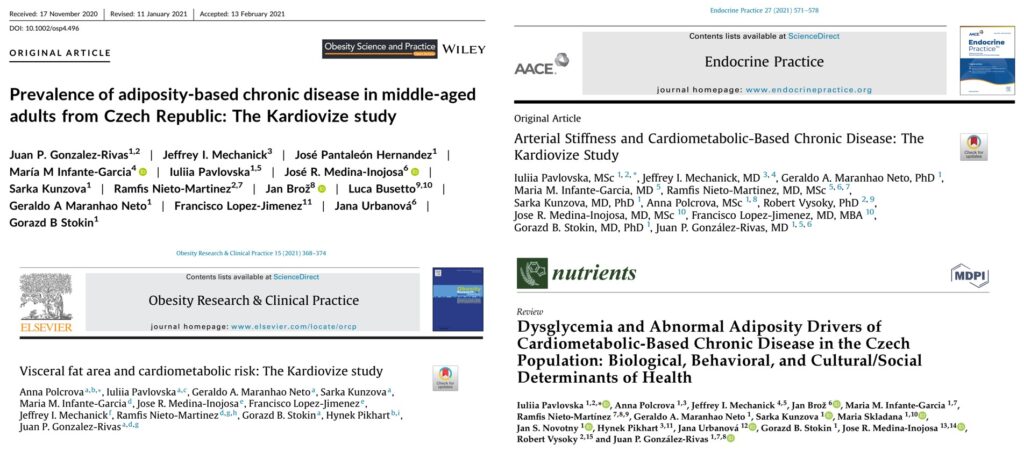
Kardiovize publications contributing to the transculturation of the tCMBCD-CZ
This work was in parallel with the preparation and implementation of a lifestyle intervention program, the tCMBCD-CZ program. This included the Czech adaptation of the Diabetes Prevention Program (DPP), the transcultural adaptation of the Mediterranean diet pattern, and the adaptation of the Transcultural Diabetes Nutritional Algorithm (tDNA). With all this content, a local coach was selected and trained to implement the intervention that facilitated the adoption of the recommendations provided by the physician and nutritionist.
This pilot study started in July with 30 participants and ended in December, with outstanding results. Remarkably, none of the participants dropout of the program, and the rate of assistance was very high. This success can be attributed to multiple aspects, including the design of the study, the site of the intervention, the stable Czech environment, but I want to highlight and thank one of the key factors, the excellent job of the coach selected for the intervention, Martina Bruzlová. Her capacity to listen and connect with the participants reminds me Oprah Winfrey.
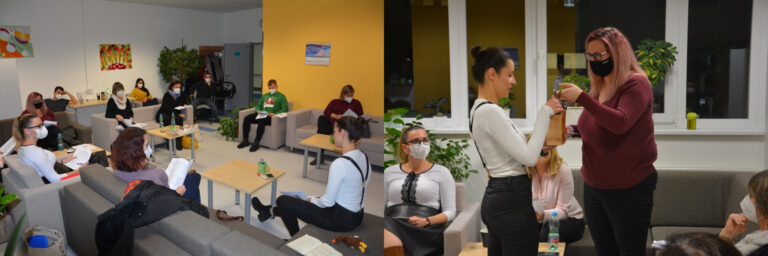
Great insights will be provided from the analysis of this intervention. Currently, the program is offered to the Czech population as a private version to ensure sustainability and scale-up.
Among other results, Geraldo Neto consolidated his adaptation to the team and contributed with his expertise. Similarly, Anna Polcrova and Magaly Serna contributed with specialized publications.
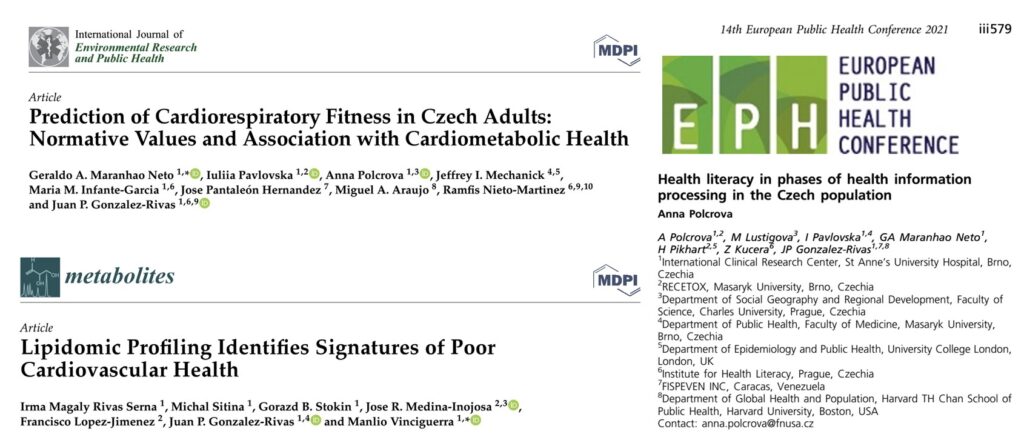
In Venezuela was the year of implementation of the HITS Diabetes with Prevention Study. A pragmatic trial sponsored by the Harvard School of Public Health. More than a hundred adults from the Andes of Venezuela were randomly assigned to answer the question if starting the Diabetes Prevention Program (DPP) with a liquid diet can lead to more weight reduction at six months than only the DPP. This program also evaluated if a preventive lifestyle program is feasible and effective to implement during a humanitarian crisis.
Admirably, the team did a successful implementation dealing with the crisis and the pandemic, simultaneously. An example for any other team worldwide! Congrats to Maria Infante, Gladiz Rivas, Sarai Castillo, Ana Rivero, Carmen Sanchez, Roald Gomez, Rebeca Figueroa, and Nora Carnevalli for their effort. Also, congrats to the team of medical students who supported the project, Natalia Sulbaran, Andrea Medina, Alexandra Dewdney, Francisco Zapata, and Patricia Monsalve.
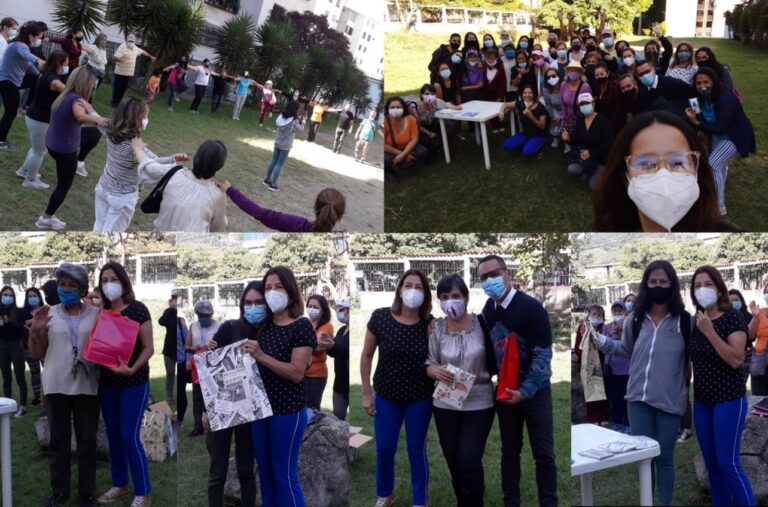
Pictures of participants attending the celebration of the end of the project, doing physical activity, and the team members received a gift as a recognition for their job.
After the publication of the EVESCAM study, our first national representative Venezuelan survey, a review of the impact of the humanitarian crisis in cardiometabolic health was published. Thanks to Carlos Ponte for the invitation to this review.
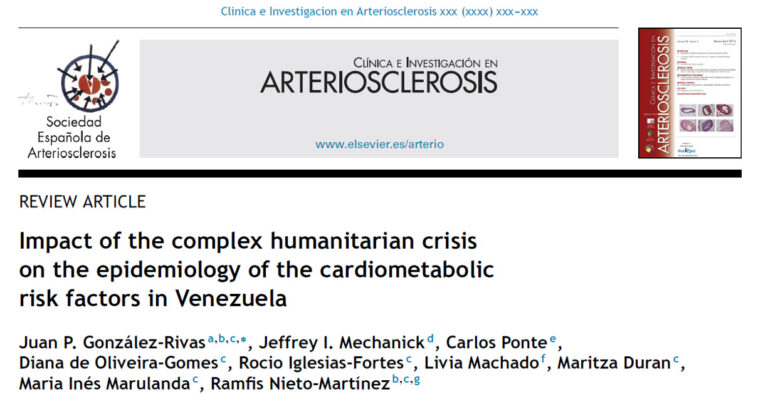
In METRICS, our monthly meetings continue and the diversity and productivity of our consortium continue rising. Currently, we are 29 active members from 14 cities in 8 countries. The multidisciplinary composition includes undergraduate students, Ph.D. students, medical doctors, specialists in internal medicine, endocrinology, diabetology, nutrition, physical activity, big data, master’s in international policy, PhDs in public health, epidemiology, among others. Here is the list of our members, an amazing hard-working group.
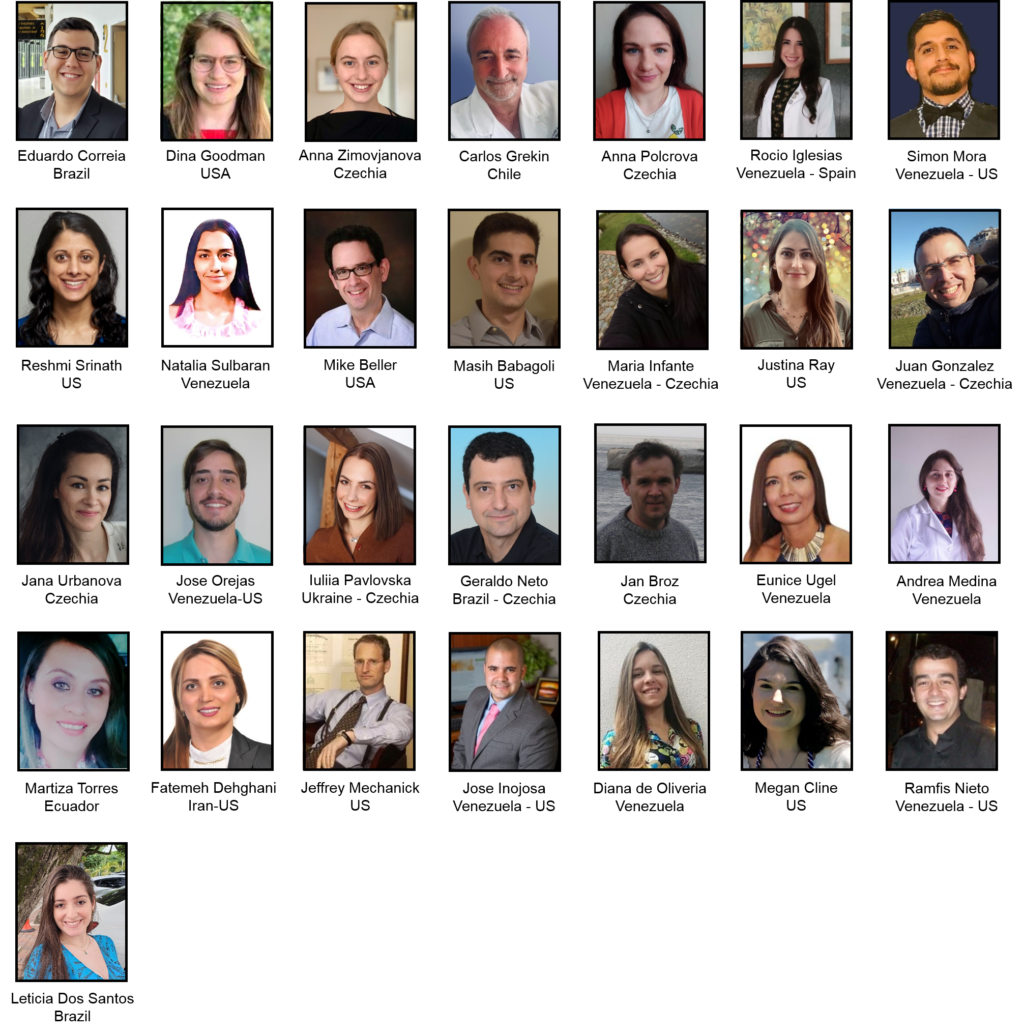
Additional to the publications mentioned, as part of the METRICS collaboration, Masih led the publication “Roles for community health workers in diabetes prevention and management in low- and middle-income countries” and together with my mentors I had the honor to publish the review “Cardiometabolic risk: New chronic care models”.
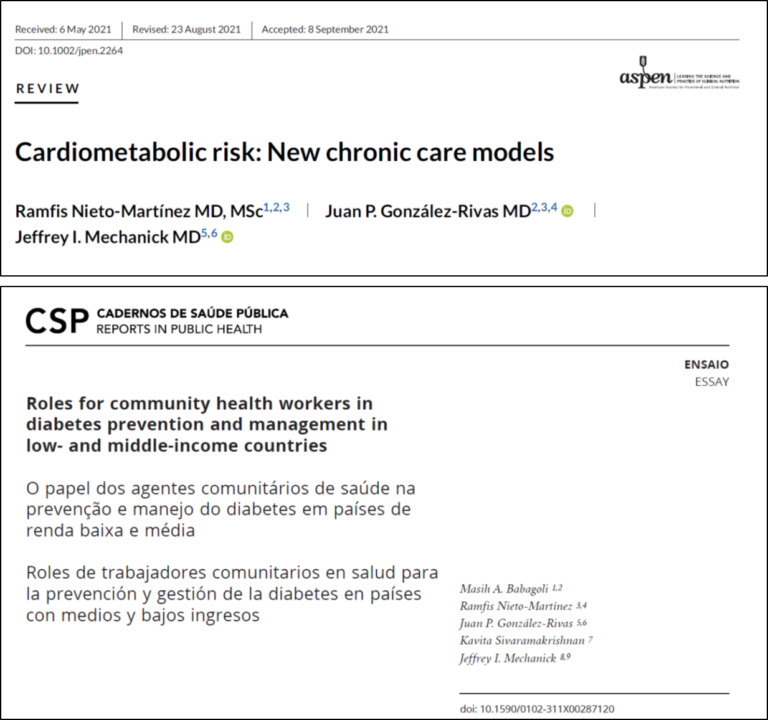
In collaboration with the International Clinical Research Center in Czechia and with researchers from the University of Barcelona, Spain, Antonio Monleon-Getino, Ph.D., MBA and Ricardo Borja-Robalino MSc, the Grant Proposal “Biological and Social Determinants of Abnormal Adiposity among Diverse Ethno-Cultural Global Populations: Identifying Actionable Transcultural Factors Using Bayesian Network Analysis”, was submitted. This grant is part of one of the most exciting projects that we are developing, using Artificial Intelligence techniques to provide new insights into the understanding of cardiometabolic disease.
With the NCD-Risk Collaboration Group, we are honored to continue providing data and collaboration to the NCD-Risk group. In 2021, the data of the EVESCAM follow-up that assessed the impact of the crisis on the Venezuelan’s health now is part of this consortium. Last year, the worldwide trend of hypertension was recently published with impressive results.
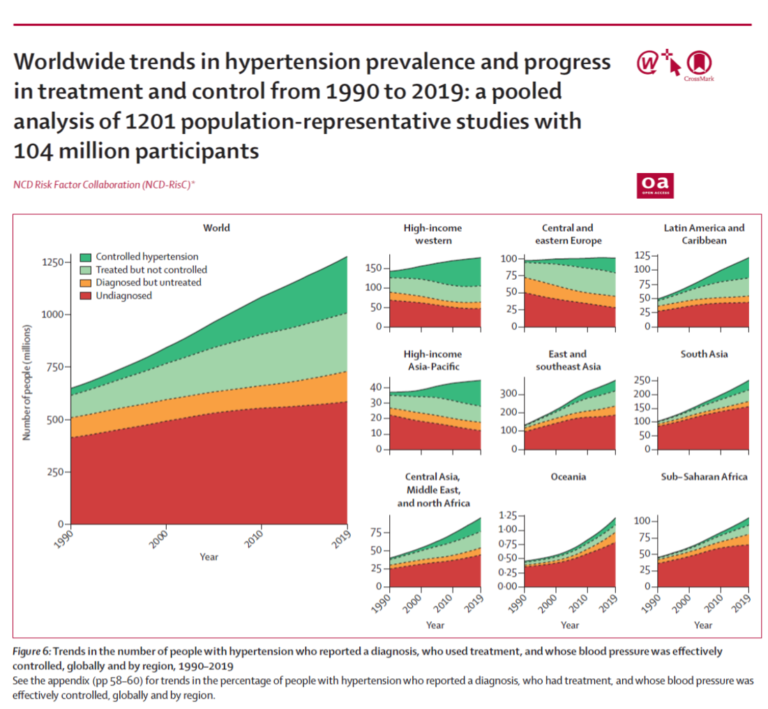
C. What is coming in 2022?
By January 2022, we have submitted 14 papers in peer-review journals, and another 10 papers are in the stage of draft ready to be submitted in the next few weeks. Additionally, we have 4 grants proposals submitted waiting for an answer in the first trimester of the year. These numbers ensure to maintain our productivity this year.
We have diverse databases to analyze that will bring us more information. In Czechia, the Follow-up of the Kardiovize Study, and the Pilot Lifestyle Intervention. In Venezuela, the Follow-up of the EVESCAM study, and the HITS study. The four studies completed the stages of data collection recently. Additionally, the Bayesian Analysis project which is using open sources of data.
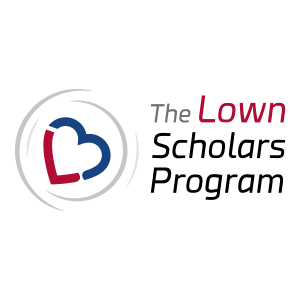
With the Lown Scholars Program of the Harvard School of Public Health, 2022 will be a year with great integration among the scholars. I’m honored to be part of two groups, Hypertension and Migrants, both projects under the leadership of extraordinary researchers, Vilma Irazola, Ramfis Nieto, and Danaei Goodarz.
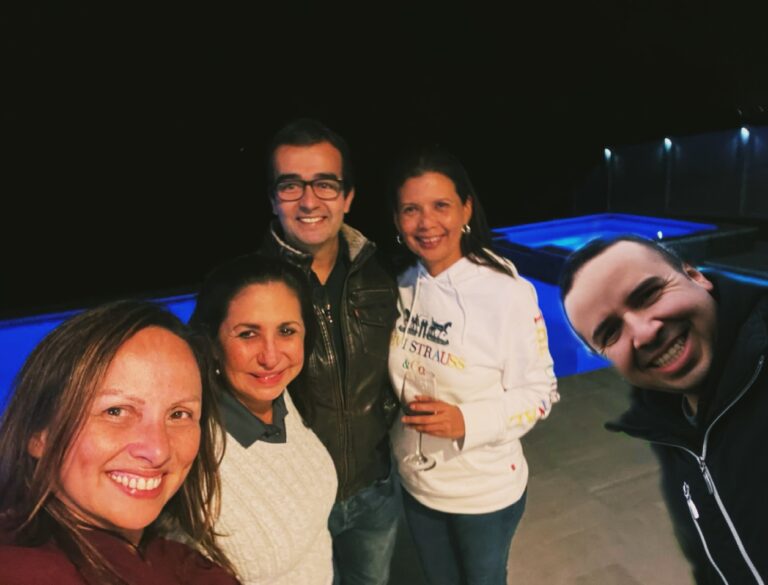
The EVESCAM team met early in 2022 in Orlando. In the picture, Maritza Dura, Maria Ines Marulanda, Eunice Ugel, Ramfis Nieto, and me (with photoshop). The strategies of publications, plan of research proposals, and sharing great time with friends were the core of the meeting. I’m happy that I was able to share with the team, at least virtually. Wonderful things come to the EVESCAM team this new year.
D. Acknowledgments
I hope that I could transmit that the achievements of the past year were a result of the collaboration of a large group of people and diverse organizations that allowed and supported our work. I hope that I have already mentioned all, but I’m sorry if some escaped to my memory.
In this section, I want to highlight the recognition to the individuals who did outstanding support, allowing me and my teams to complete a great year.
Gorazd Stokin, former Chairman of ICRC and PI of the Translational Neuroscience and Aging Program, has been a true mentor and friend since my arrival to the Czech Republic. In every moment that I have a doubt, I know that I can count on his advice and support. Additionally, Gorazd has an excellent sense of humor and impressive knowledge about Latin America, which makes him a perfect person to go out and share some Pivo (Czech Beers).
Pavel Ivanyi, former interim CEO of ICRC. 2021 was a tough year for ICRC, a year that required a huge re-structuration and difficult decisions, and I was a witness, and tried to learn, how Pavel dealt with these situations with transparency, communication, and serenity. I thank Pavel for being a “defender” and supporter of our team in these hard times.
Thanks to Gorazd and Pavel, in Kardiovize, we can continue producing high-quality research in 2022
I want also to provide special thanks to Mike Beller, who is Principal at Beller Tech LLC in NY, and a specialist in Big Data. For months, Mike is providing us with his time and knowledge to kindly introduce us to the world of Big Data and Artificial Intelligence analysis. I’m learning a lot from Mike, and not only statistical aspects, I named one lesson “Mike’s pillars in Project Management”, he told to us:
– “Juan, we need project management, we need to know where we go (vision), which are the task to be done to get there, determine the persons who are going to do those tasks (team), and supervision, we need to do supervision (he highlighted), because without supervision this is not going to work”
I was paying attention to this statement, which looks so simple, and even obvious, but is everybody doing it so clearly? Am I doing it so clearly? I don’t this so. I have been thinking about it since that meeting, and I’m trying to implement it in every project that I’m doing it.
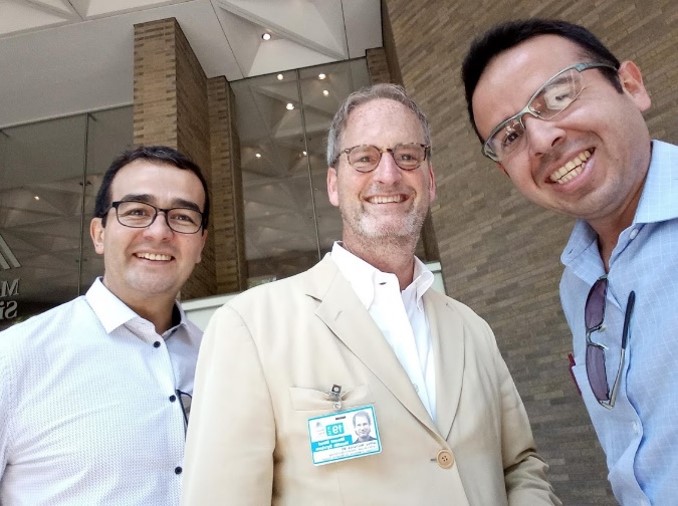
From the deep of my heart, I want to thank my mentors Ramfis Nieto and Jeffrey Mechanick who always are there providing me ideas, feedback, establishing new ambitious goals, and being good friends. I’m extremely lucky to have the support of two great mentors.
I hope we will be able to meet in person this year and update our picture haha!
Finally, I want to thank Maria, my wife, and my three, now not so little, daughters, Maria Laura, Ana Sofia, and Maria Valeria, who fill my life with so much joy, happiness, and love. They make it easy to reach any goal, and support me in any kind of crazy adventure that appears. I’m a lucky person that can fill their love and try to enjoy with them every second.
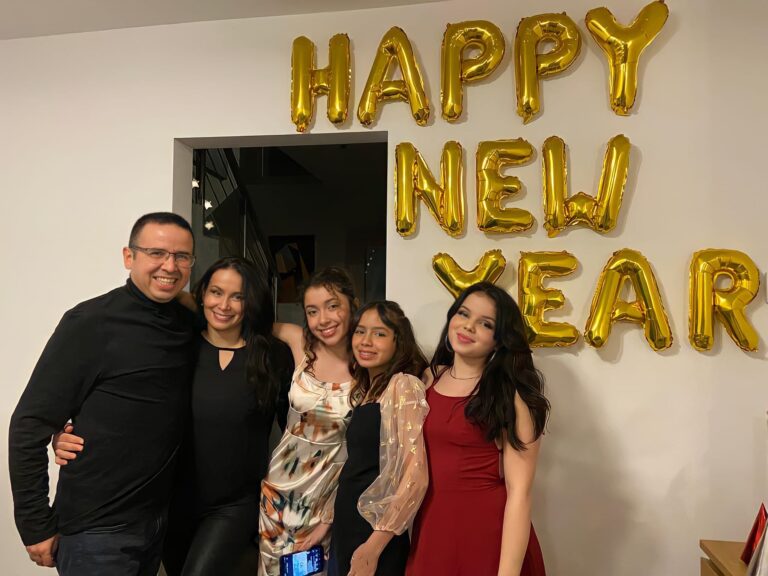
Thanks for reading this letter, I hope these words inspire you to move forward intensively with your plans in 2022.
Juan Pablo
Emails: Juanpgonzalezr@hotmail.com / juan.gonzalez@fnusa.cz